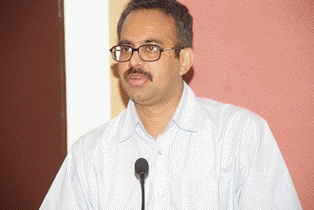
Description:
Topic : "Marketing Research Applications"
Speaker : Mr. Ashok R Sankethi,
CEO,
Kaybase, Chennai.
Batch : 2015
Date : 07-02-2014
Time : 02.00 PM - 05.00 PM
Venue : Lecture Hall 6

Description:
Topic : "Marketing Research Applications"
Speaker : Mr. Ashok R Sankethi,
CEO,
Kaybase, Chennai.
Batch : 2015
Date : 07-02-2014
Time : 02.00 PM - 05.00 PM
Venue : Lecture Hall 6
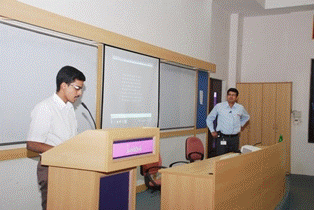
Description:
Topic : "Strategic Enterprise Management - An MNC Perspective"
Mr. Srinath Ganesan,
Program Manager- Gove
ance Risk & Compliance- Products & Services.
Description:
JSB NEWS (October - December 2013)
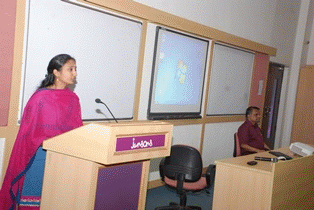
Description:
Topic : "Practical aspects of Working Capital Management"
Speaker : Dr. V. Prasanna Bhat,
(Former MD-ITCOT & Advisor-Saudi Arabian Monetary Agency),
CORPORATE ADVISOR - Shriram Group,
Batch : 2015
Date : 25-01-2014
Time : 1.30 PM - 3.00 PM
Venue : Lecture Hall 6
Dr. V. Prasanna Bhat, with his rich experience in the banking and consulting, handled a session for first year students in the area of working capital mangement. The resource person explained the concepts in a very simple language quoting many examples from industry as well as day-to-day life. The session was interactive and students got a good understanding of the nuances of working capital management.
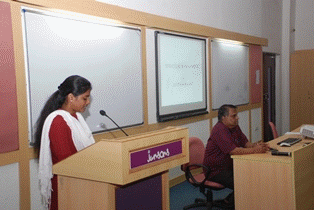
Description:
Special Lecture on ‘Strategy formulation and Grand strategies’
Dr. V.Prasanna Bhat (Former MD—ITCOT & Advisor-Saudi Arabian Monetary Agency) & Corporate Advisor - Shriram Group, Chennai
Dr. Prasanna Bhat started with introducing the basic concepts of Strategy and then he explained many strategies followed in Industry.
The following is the gist of his lecture:
Strategic management is conceptual in nature and it requires different thinking. Strategy refers to a course of action one takes in order to stand on the top always or reach the top in the competitive business world. Strategic management is referred to as the cutting edge of any organization.
In the forest the lion and the deer are in constant fight for survival. Only the faster lion or the deer than the fastest of the rest will succeed and survive. This example helps us to understand that the need to be faster than the fastest growing organization is needed. Even the monopoly organizations are in need of strategic management for stability growth and profitability. Assessing the strengths and weakness of the organization will help to understand the standing of the companies.
There are many strategies like the general strategies and functional strategies whose effectiveness can be improved through the following principles/practices.
The speaker explained every concept with suitable example.
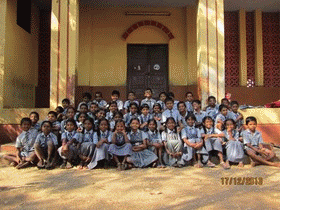
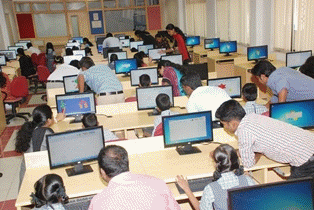
Description:
Yuvakarya, a social project undertaken by a few students of the 2014 Batch, involved handling Spoken English sessions (for the last 6 months) for the 4th standard students of RC Primary School located at Karumathampatti. As a way of concluding this project, 43 students of RC Primary School, accompanied by two faculty members of the school, were invited by JSB, to visit its campus on 18th December 2013. Motivational videos were shown, and a drawing competition was conducted as part of the last session. During the day, the students were exposed to using basic functions in computers, with each one of them being taught by one of the students from the 2014 Batch. The students were provided lunch and evening snacks. They were dropped back at RC Primary School in the evening. As a token of love, each of the students was given a small gift.
Description:
JSB NEWS (July - September 2013)
Description:
Topic : "Export Procedure and documentation"
Speaker : Mr. David Solomonraj,
Manager - Business Development,
M/s. Chakiat Agencies Pvt. Ltd.,
Coimbatore.
Batch : 2014
Date : 06-10-2013
Time : 09.30 AM - 12.30 PM
Venue : Lecture Hall 6
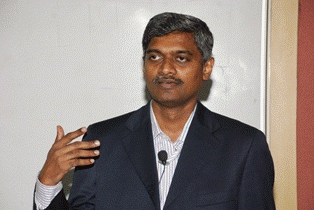
Description:
A Workshop on “Advertising: the pre-eminence of Consumer Insights and Creativity” was conducted on Friday, 27th September from 9am to 4pm.
Resource persons: Mr Ravindran Solomon, Creative Director, Salt Creatives (ex-JWT) & Mr. M Elango, Vice President, Interface Communications / Draftfcb Ulka Group
This one day workshop conducted in Jansons School of business, was really an advantage for the students. The one day workshop was really made interactive and highly creative by the guests of the day.
The workshop was all over creative and professional. Various aspects like how an advertisement has to be created, what are the aspects to be taken care while marketing a product? Product targeting, segmentation and positioning were taught through various advertisement clippings. Elaboration on how to create a theme based on consumer insight, and make an advertisement was the highlight of the workshop. Various case studies and examples were taken up.
All the participants were given opportunity to bring out their creative spark through launching a creative theme and advertisement idea. It was an idea generation pool up session. The entire workshop was educative and it helped to open up new avenue of thoughts among students.
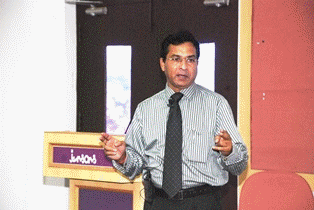
Description:
Date : 17 & 18 August 2013
Batch : 2015
The program titled “The Zone beyond IQ & EQ ….onto the Next orbit of LEADERSHIP EXCELLENCE” was organised during 17th and 18th of August, 2013.
The program was delivered by Mr. Pramod Sadarjoshi, an eminent resource person who is presently a consultant and a registered executive coach at Indian School of Business, Hyderabad. Educated from Tata Institute of Social Sciences with an MA in Human Resources, he worked in key portfolios in various companies. Before tu ing up as coach he was Executive Director – Human Resource in J P Morgan Chase. He has contributed in the industry-academia synergy by being a visiting faculty and as adviser at leading B-schools and technical institutions (The IIMs, the IITs and other premier institutes included).
In the first session, Mr. Pramod Sadarjoshi gave a detailed overview of the present business environment and how to survive in it. He termed it as “VUCA” world. Acronym of VUCA is Volatile; Unpredictable; Complex and Ambiguous. He asked the students to showcase the following characteristic traits such as trust-worthiness, service orientation, being innovative, and tech savvy to survive in this hostile environment.
The program moved on to the next phase where the students were enlightened with an interesting topic titled “Seven Bad Habits of Good Companies.” It included many keywords that were discussed like:
>> Complacency - Success breeds failure
>> Arrogance - Overblown self image of superiority and self importance
>> Denial – a cocoon of myth, ritual and orthodox like ostrich, buried in one’s own ego.
>> Competency dependence – the curse of incumbency
>> Competitive myopia – tendency to narrow down the focus to a few, non long term plans.
>> Volume obsession – no ethics, greedy for money, reflection of inelastic cost structure and
intense market competition.
>> Territorial impulse – affinity and identity to a functional discipline.
The speaker said, “today the customers don’t ask ‘What can you do for me?’, but they are more interested in asking ‘What else can you do for me?’ This is the quintessential differentiator, the new DNA of the today’s generation which looks for instant gratification”.
The speaker suggested two books that should be read by the students.
Aagman 2013, the induction programme for 2015 batch was conducted from 13th August, 2013 to 15th August, 2013. The entire programme was organised by the students of 2014 batch. The jou ey of Aagman started with a formal introduction about the life at JSB; a short introductory video about the faculty team and about the JSB campus. The theme for Aagman 2013 was "Colors depicting the Colorful Life of JSB".
The 2015 batch was grouped into various teams to inculcate the team spirit within them and also to give them a chance to get to know about their fellow mates. To make the entire jou ey of Aagman more interesting, each team had two 2014 students to guide and coordinate the team all through the programme.
The first game, ‘Smash it’, set the tone for the rest of the games. It was conducted to break the ice and trigger the competitive spirit among the teams. This was followed by various other games which were mainly conducted to showcase their skills in creativity, presence of mind, observation, strategic planning and stress management, and above all to build trust among their own team members.
The game ‘Treasure hunt’ gave the new JSBians an opportunity to explore the campus and discover various facilities. ‘Challenger’ was a special game which gave them a chance to realize the strength of each team and build on it to beat the other teams. There were events to test even the individual capabilities. People who proved their caliber were crowned ‘Management King & Queen’.
A sapling was planted by juniors and seniors symbolizing a new beginning at JSB. There was a separate interaction between the senior and junior members of the various houses focusing on various clubs and house activities in JSB. Finally the programme came to an end with a cultural event, after three beautiful days of jou ey and it was a platform for the students of both 2014 & 2015 to showcase their talents.
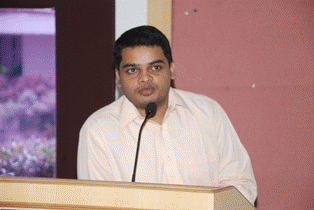
Description:
Mr. Ravi Venkatesh, Business Analyst Professional at NTT DATA spoke to the Second Year MBA students about the Role of a Business Analyst. He shared his experience of having worked across various domains such as Retail, Healthcare, Transportation, Insurance and Telecommunications. He stressed that the role had more to do with attitude than qualification and explained how an analyst serves as a bridge between the client and software vendor. He explained that the work involved analysis of existing design of systems and business models and their integration with technology.
Description:
JSB NEWS (April -Jun 2013)
Description:
JSB News (Jan - Mar 2013)
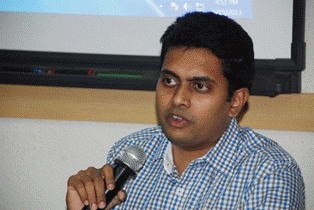
Description:
The session was started with an introductory note by Ms. Shiniy Cynthiya. Mr. Gnana Sekar Kandaswamy, Managing Director of Pazhamudhir Nilayam, the pioneering venture in the field of fruits and vegetable retailing interacted with our 2014 batch students on 15 March, 2013. He started the session by highlighting higher opportunities available in the Indian retail sector.
Mr. Gnana Sekar Kandaswamy also gave a bird’s eye view of the operations of his venture. The students came to appreciate how a traditional, unorganised segment of retail is getting transformed into a professionally run organised company. He spoke at length about the unique positioning of Pazhamudhir Nilayam by outlining the strategy of store design, ambience and store space. The session was completely interactive with a number of students asking variety of questions relating to Indian retail in general and Pazhamudhir Nilayam in particular. He concluded with a distilled wisdom of his entrepreneurial experience:
“Doing simple things for long time is a difficult task”
With Mr. Ruben delivering the vote of thanks, the session came to an end.
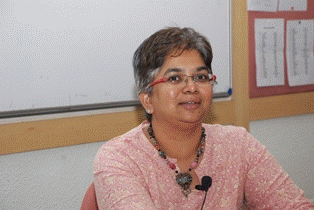
Description:
Ms. Gowthami, CEO of Travel Another India – a social enterprise operating in the rural tourism space – visited our Campus, spoke and interacted with our 2014 Batch students on 8th March, 2013, which happens to be the Woman’s Day.
Ms. Gowthami, started by posing a question to the students: “Why Woman’s Day should in the first place to be celebrated?” In addition to explaining the historical gender discrimination, she drove home how the mental make-up of people promotes such discrimination resulting ultimately in unfavourable sex ratio in the country today.
Switching to the topic of her presentation of her own “Jou ey into Another India”, Gowthami explained in detail the pains and pleasures involved in the jou ey of a social entrepreneur in an uncharted area. She discussed at length about the problems she encountered and encouraged students to face failures in order to achieve what they wanted to.
Ms. Gowthami’s presentation provoked a lengthy and lively interaction from the students. Most of the questions revolved around her choice of the project, adoption of a particular business model and future plans for her company. She answered all the questions with a lot of passion and patience.
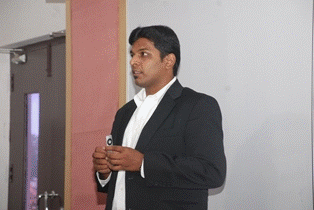
Description:
On 1st of March 2013, an Interaction program was conducted, which was headed by Mr.Shyam Velumani, CEO of the website ‘Vivaha.com’. The interaction was about the topic “Do you want to become an Entrepreneur?”. He spoke about the following:
What is Entrepreneurship?
It is any new idea which can be made into a profitable business. There are lots of opportunities to make use of to become an Entrepreneur. Even make the negative opportunities positive to become an Entrepreneur. Generate new ideas and brainstorm with your peer group.
A Startup Business Cycle:
First get inspired to start a business, then generate new ideas, brainstorm with your circle of people, ask for suggestion, build the prototype, invest in the business, checkout with the venture capitalist, modify the prototype if any good suggestions are obtained, launch the product/service, take the reviews, gather people, make the people like the product/service and finally launch the product/service in the market.
And he also said about the important things to be remembered by an Entrepreneur they are Idea, Investment, Strategy, Finding valuable partners, Proper recruitment of Employees, Creating website, Marketing, Customer service, Making profit, Reinvesting profits and Beating the competition.
Questions were raised by the students followed by the discussion. The speech provided an inner urge to become an Entrepreneur.
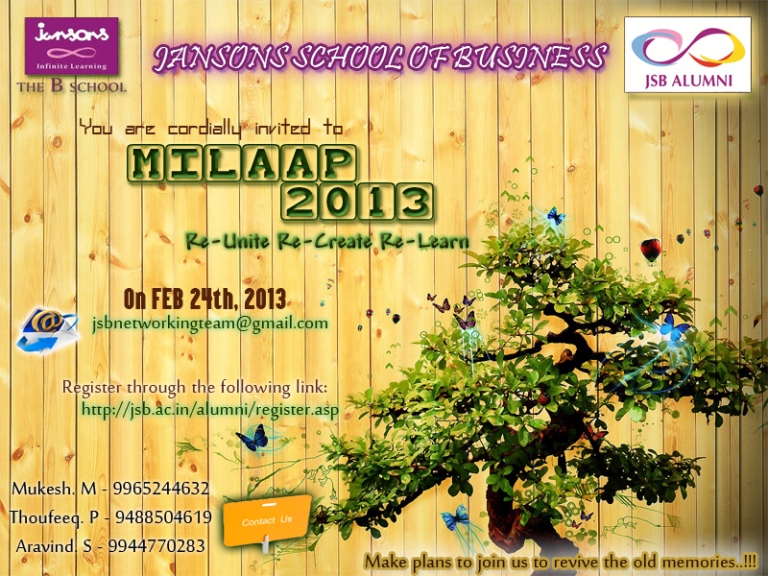
Description:
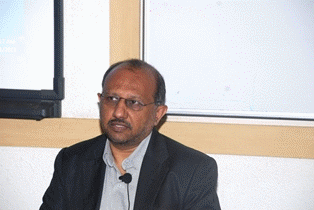
Description:
EIP on 21/02/13 Mr.Balachandran Dharmen, Director, RR Kabel Limited – for 2012 Batch on ‘Strategic management in Multi-business Organisations’.
The session started with a discussion on good strategy, poor strategy and mid-course corrections that are necessary for a continuous flow of business operations. The key points that were discussed in the session were
The speaker mentioned that there will be a thread that links the different businesses when a firm is into multi-business. The speaker made it easy for the audience to understand about multi-business strategy by stating a live example about Ram Ratna group which enabled the group to have a clear understanding about the discussion. For a firm venturing in to multi-business, the following key actions were emphasized by the speaker:
The session was concluded with a note on using the human resources effectively to monitor the different types of businesses.
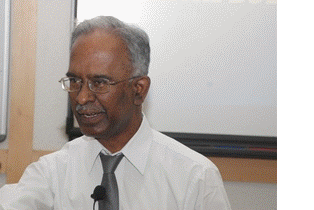
Description:
Mr.K.Ravi started the session by a simple question what is the function of Finance. In the process ,the emphasis was on the calculation of cash flows. He discussed about the practical utility of NPV and IRR. He also discussed how the companies are preparing the capital budget and what inputs they take into account for such decisions. The session was very interactive.